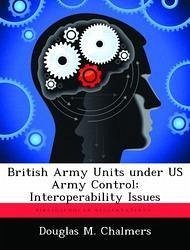World War II laid the foundations for a 'special relationship' between the UK and US, with security being its primary purpose. Since the end of that war, the threat of Soviet expansion caused it to deepen. Time changed the balance of the relationship, with Britain firmly becoming the junior partner. A side effect of this was that British troops were placed under US control during both the Korean and Gulf Wars. This monograph initially looks at the relationship to see if this situation could reoccur. As it finds that it is likely to reoccur, the remainder of the paper is used to identify issues that could reduce the efficiency of such a combined force in the future. In order to do this the Korean War is used as a case study. This war was chosen as it was the first and arguably the most complex operation to have seen British forces under US control. This paper finds that although the Armies were of equal capability, friction developed between the formation headquarters. The monograph speculates that the primary cause of this friction was a lack of understanding of the implicit intent of either side, which in turn led to occasional misunderstandings and inefficiencies. The monograph then looks at the forces in 2001 to see if the issues of 1950 remain relevant. Before conducting that comparison, it reviews the intervening fifty years. The paper notes that the problems identified in Korea were not as prevalent during the Gulf War. It argues that this was primarily because of NATO experiences and the use of an integrated staff. This chapter concludes by comparing the forces of both eras and finds the forces of 2001 to be in a far better position than those of the 1950's. However, it highlights that the bedrock of this position lies in the residual NATO experiences of its senior commanders, which is not being systematically replaced under the current education and training systems. The last chapter looks forward to the future and proposes that the reduction in the tactica
Hinweis: Dieser Artikel kann nur an eine deutsche Lieferadresse ausgeliefert werden.
Hinweis: Dieser Artikel kann nur an eine deutsche Lieferadresse ausgeliefert werden.








